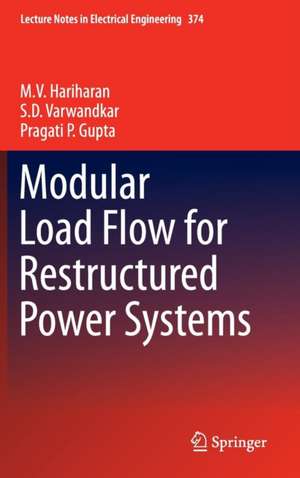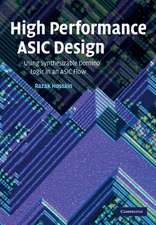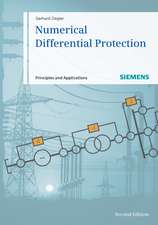Modular Load Flow for Restructured Power Systems: Lecture Notes in Electrical Engineering, cartea 374
Autor M.V. Hariharan, S.D. Varwandkar, Pragati P. Guptaen Limba Engleză Hardback – 16 feb 2016
Second authorhas had first author as teacher and third author as student. The lecture notestherefore reflect ethos of three generations of teachers.
| Toate formatele și edițiile | Preț | Express |
|---|---|---|
| Paperback (1) | 632.55 lei 3-5 săpt. | |
| Springer Nature Singapore – 31 mar 2018 | 632.55 lei 3-5 săpt. | |
| Hardback (1) | 557.76 lei 39-44 zile | |
| Springer Nature Singapore – 16 feb 2016 | 557.76 lei 39-44 zile |
Din seria Lecture Notes in Electrical Engineering
- 18%
 Preț: 1859.04 lei
Preț: 1859.04 lei - 18%
 Preț: 895.27 lei
Preț: 895.27 lei - 17%
 Preț: 397.66 lei
Preț: 397.66 lei - 18%
 Preț: 1562.17 lei
Preț: 1562.17 lei - 20%
 Preț: 1473.39 lei
Preț: 1473.39 lei - 18%
 Preț: 5169.60 lei
Preț: 5169.60 lei - 20%
 Preț: 1741.49 lei
Preț: 1741.49 lei - 20%
 Preț: 1918.04 lei
Preț: 1918.04 lei - 18%
 Preț: 1573.20 lei
Preț: 1573.20 lei - 18%
 Preț: 1851.77 lei
Preț: 1851.77 lei - 18%
 Preț: 1578.72 lei
Preț: 1578.72 lei - 18%
 Preț: 1903.08 lei
Preț: 1903.08 lei - 18%
 Preț: 2113.02 lei
Preț: 2113.02 lei - 18%
 Preț: 892.42 lei
Preț: 892.42 lei - 18%
 Preț: 1404.30 lei
Preț: 1404.30 lei - 18%
 Preț: 1133.61 lei
Preț: 1133.61 lei - 18%
 Preț: 1847.84 lei
Preț: 1847.84 lei - 18%
 Preț: 1384.56 lei
Preț: 1384.56 lei - 20%
 Preț: 1300.14 lei
Preț: 1300.14 lei - 20%
 Preț: 1174.76 lei
Preț: 1174.76 lei - 20%
 Preț: 1310.03 lei
Preț: 1310.03 lei - 18%
 Preț: 2546.29 lei
Preț: 2546.29 lei - 20%
 Preț: 1310.03 lei
Preț: 1310.03 lei - 18%
 Preț: 1676.58 lei
Preț: 1676.58 lei - 20%
 Preț: 1182.20 lei
Preț: 1182.20 lei - 18%
 Preț: 1392.46 lei
Preț: 1392.46 lei - 18%
 Preț: 1119.38 lei
Preț: 1119.38 lei - 18%
 Preț: 1678.16 lei
Preț: 1678.16 lei - 18%
 Preț: 1596.85 lei
Preț: 1596.85 lei - 18%
 Preț: 1398.00 lei
Preț: 1398.00 lei - 20%
 Preț: 1445.35 lei
Preț: 1445.35 lei - 18%
 Preț: 1244.89 lei
Preț: 1244.89 lei - 20%
 Preț: 1173.10 lei
Preț: 1173.10 lei - 18%
 Preț: 810.81 lei
Preț: 810.81 lei - 20%
 Preț: 1173.93 lei
Preț: 1173.93 lei - 20%
 Preț: 1482.47 lei
Preț: 1482.47 lei - 20%
 Preț: 1915.57 lei
Preț: 1915.57 lei - 18%
 Preț: 1387.73 lei
Preț: 1387.73 lei - 18%
 Preț: 1425.62 lei
Preț: 1425.62 lei - 20%
 Preț: 1297.67 lei
Preț: 1297.67 lei - 18%
 Preț: 1407.46 lei
Preț: 1407.46 lei - 18%
 Preț: 1667.91 lei
Preț: 1667.91 lei - 18%
 Preț: 1400.35 lei
Preț: 1400.35 lei - 18%
 Preț: 1117.03 lei
Preț: 1117.03 lei - 18%
 Preț: 1573.20 lei
Preț: 1573.20 lei - 18%
 Preț: 1405.90 lei
Preț: 1405.90 lei - 18%
 Preț: 726.37 lei
Preț: 726.37 lei - 18%
 Preț: 1405.90 lei
Preț: 1405.90 lei - 18%
 Preț: 1238.56 lei
Preț: 1238.56 lei - 18%
 Preț: 725.61 lei
Preț: 725.61 lei
Preț: 557.76 lei
Preț vechi: 697.20 lei
-20% Nou
Puncte Express: 837
Preț estimativ în valută:
106.73€ • 114.13$ • 88.99£
106.73€ • 114.13$ • 88.99£
Carte tipărită la comandă
Livrare economică 14-19 aprilie
Preluare comenzi: 021 569.72.76
Specificații
ISBN-13: 9789811004964
ISBN-10: 981100496X
Pagini: 113
Ilustrații: XX, 113 p. 53 illus.
Dimensiuni: 155 x 235 x 10 mm
Greutate: 0.37 kg
Ediția:1st ed. 2016
Editura: Springer Nature Singapore
Colecția Springer
Seria Lecture Notes in Electrical Engineering
Locul publicării:Singapore, Singapore
ISBN-10: 981100496X
Pagini: 113
Ilustrații: XX, 113 p. 53 illus.
Dimensiuni: 155 x 235 x 10 mm
Greutate: 0.37 kg
Ediția:1st ed. 2016
Editura: Springer Nature Singapore
Colecția Springer
Seria Lecture Notes in Electrical Engineering
Locul publicării:Singapore, Singapore
Cuprins
Preliminaries.- Circuit Theory Solutions.- Kirchhoff State.-Modular Load Flow.- Load Flow Examples.- Outage Analysis.- Voltage Stability.-Optimization.- Dirac Structures.- Security Diagnostics – A Case Study.
Notă biografică
Prof. M.V. Hariharan is Gold Medal awardee for hisperformance in B.Tech in the entire state of Madras (1954) and a UNESCO scholar(1959). He has been a popular faculty at IIT Bombay, Mumbai (1962 – 93) and isknown for his down-to-earth teaching methods. He has been Visiting Professor atUniversity of Manitoba, Canada (1987) and at University of Western OntarioLondon, Canada (1988). He was consultant to Tata Consulting Engineers,Maharashtra State Electricity Board, now restructured as Mahagenco (MSPGCL),Mahatransco (MSETCL) and Mahadiscom (MSEDCL). Prof. Hariharan has carried outresearch projects for Department of Science and Technology, India and haspublished papers in international journals. He has guided many PhD students.
Prof. S.D. Varwandkar, PhD (IIT Kanpur, India) was facultyat VJTI, Mumbai (1969 – 2004) and has taught courses on Electrical Machines,Power System Analysis, and Planning and Reforms and has published ininternational journals and guided three PhD students. He has carried outprojects for Board of Research in Nuclear Sciences, India and was ExpertConsultant at Global R & D, Crompton Greaves, Mumbai (2007 – 08).
Ms. Pragati P. Gupta topped in BE among all branches ofEngineering at Dibrugarh University in 1991 and in M.Tech (Power Systems) atVJTI. She is currently Assistant Professor of Electrical Engineering at VJTIand is associated with teaching of courses in Power Systems, especiallyDeregulated Systems.
Prof. S.D. Varwandkar, PhD (IIT Kanpur, India) was facultyat VJTI, Mumbai (1969 – 2004) and has taught courses on Electrical Machines,Power System Analysis, and Planning and Reforms and has published ininternational journals and guided three PhD students. He has carried outprojects for Board of Research in Nuclear Sciences, India and was ExpertConsultant at Global R & D, Crompton Greaves, Mumbai (2007 – 08).
Ms. Pragati P. Gupta topped in BE among all branches ofEngineering at Dibrugarh University in 1991 and in M.Tech (Power Systems) atVJTI. She is currently Assistant Professor of Electrical Engineering at VJTIand is associated with teaching of courses in Power Systems, especiallyDeregulated Systems.
Textul de pe ultima copertă
Inthe subject of power systems, authors felt that a re-look is necessary at someconventional methods of analysis. In this book, the authors have subjected thetime-honoured load flow to a close scrutiny. Authors have discovered and discusseda new load flow procedure – Modular Load Flow. Modular LoadFlow explores use of power – ascalar – as source for electrical circuits which are conventionally analysed bymeans of phasors – the ac voltages or currents. The method embeds Kirchhoff’scircuit laws as topological property into its scalar equations and results in aunique wonderland where phase angles do not exist! Generatorsare shown to have their own worldswhich can be superimposed to obtain the state of the composite power system. The treatment is useful in restructured powersystems where stakeholders and the system operators may desire to knowindividual generator contributions in line flows and line losses for commercialreasons. Solution in Modular Load Flow consists of explicit expressions whichare applicable with equal ease to well-conditioned, ill-conditioned and verylow voltage situations. It is found to be computationally much faster than theiterative load flows and indicates promise for online application. Indian blackoutsof July 30 and 31, 2012 are analysed using an equivalent grid network toindicate its utility. Besides its ability to deal with ground reality in powersystems, Modular Load Flow points to a theory that unveils interestingmathematical structures which should entice avid researchers.
Second authorhas had first author as teacher and third author as student. The lecture notestherefore reflect ethos of three generations of teachers.
Second authorhas had first author as teacher and third author as student. The lecture notestherefore reflect ethos of three generations of teachers.
Caracteristici
Presents the theory of modular flow in solving normal and ill-conditioned systems Entails an elegant theory based on orthogonality, Hilbert spaces and Dirac structures Introduces new concepts with simple numerical problems Includes supplementary material: sn.pub/extras













